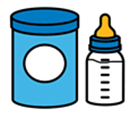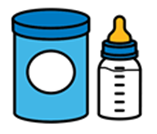There are many different formula milks on the market. This can be very confusing when you are choosing what to feed your baby. The golden rule to follow is first stage formula only, up to one year.
 Babies up to six months of age should only have formula based on cows or goats milk.
Babies up to six months of age should only have formula based on cows or goats milk.
Unless advised by a health professional, do not give soya based formula to babies under six months as this can damage developing teeth.
After six months, please discuss with a health professional giving soya milk. If you are worried about milk allergies or think your baby needs a specialist formula, please speak to your GP or health visitor.
First Stage Infant Formula
If you plan t o give your baby any formula within the first 12 months, this needs to be first stage infant formula. Only give other formulas if you are advised to do so by a medical professional.
o give your baby any formula within the first 12 months, this needs to be first stage infant formula. Only give other formulas if you are advised to do so by a medical professional.
First stage infant formula is based on whey protein which is easier for your baby to digest.
Follow on formulas that are advertised are not necessary for your baby after six months and are not needed. They do not provide any extra health benefits to your baby.
You may be aware that formula come s in powder form or in ready made cartons. Both types of formula will be available in supermarkets and pharmacies.
s in powder form or in ready made cartons. Both types of formula will be available in supermarkets and pharmacies.
Powdered formula comes in tins and needs you to add water at 70 degrees centigrade or above to make a bottle. It is very important to follow the guidance on how to safely prepare powdered formula to prevent your baby getting sick.
Read more about how to prepare a bottle safely
Ready made formula comes in cartons of various sizes and does not require any preparation other than sterilisation of bottles and teats. Cartons of formula can be useful if you are going out with your baby or for occasional feeds. They tend to be more expensive, use more packaging and, once opened need to be used quicker than powdered formula.
Types of Formula
For a health y baby it doesn't matter what brand of formula you choose. All brands of formula have to meet strict nutritional and safety standards and have very similar ingredients, although there may be some difference if extra ingredients are added. There is no evidence that any of the extra ingredients have any benefit to your baby.
y baby it doesn't matter what brand of formula you choose. All brands of formula have to meet strict nutritional and safety standards and have very similar ingredients, although there may be some difference if extra ingredients are added. There is no evidence that any of the extra ingredients have any benefit to your baby.
You may see formula that claims to help babies who are hungrier, have colic, constipation or even to sleep better. These formulas are often casein based, which is harder for babies to digest than whey. This can lead to constipation or make your baby more unsettled.
There are also lactose free, anti reflux and hypo-allogenic formulas on the market. These should not be given to your baby without seeking medical advice first.
If you are worried your baby has allergies or other dietary requirements please speak to your GP or Health Visitor.
If your baby is less than 28 days old you can contact your local midwifery team or you can contact the Healthy Child Programme at any time following your baby's birth by calling Just One Number on 0300 300 0123 or texting Parentline on 07520 631590.
Our opening hours are 8am-6pm Monday to Friday (excluding bank holidays) and 9am-1pm on Saturdays.
Norfolk Healthy Child Programme has a team of infant feeding champions who can contact you by video call/telephone initially to discuss your questions and refer you to further help if required. All of our staff are trained to Unicef standards to provide you with the best possible breastfeeding support and advice.
It may help in the first instance to read the Essential Guide to Feeding & Caring for your Baby.
Norfolk’s Early Childhood and Family Service (ECFS) offers support for all parents and carers with children aged 0 to 5 years.
To speak to other Norfolk parents and carers, you can join our online community forum below.
Also in this section...